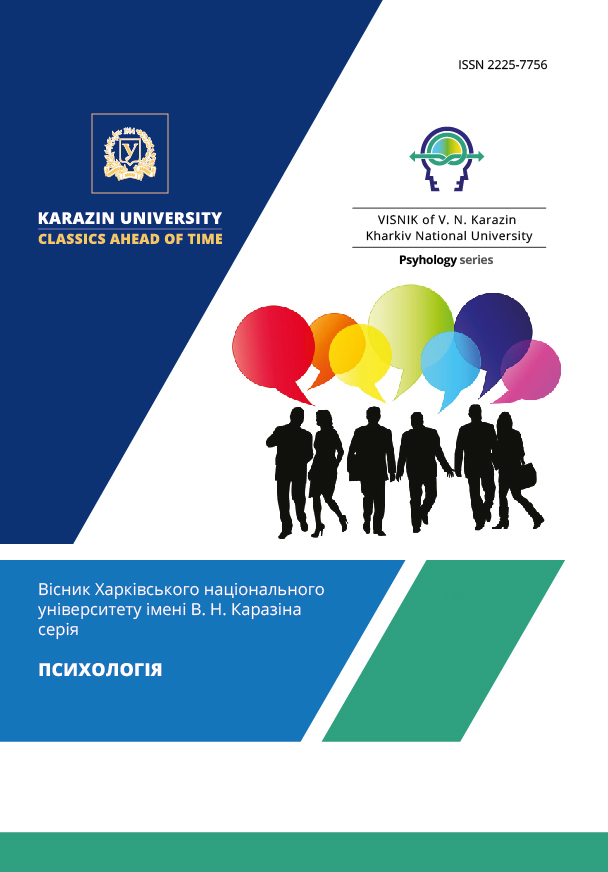The Relationship Between Emotional Memory (Memories) and Protective Mechanisms of Young People
Abstract
The article examines the phenomenon of emotional memory of a person, which is understood as the memory of emotional states that took place in the past. A significant link has been established between emotional memory and protective mechanisms in young people, with protective mechanisms processing memories of both the distant and recent past in inverse proportion. It is noted that the "pleasant" in content, strongly emotionally colored events of the distant past in young people are reproduced proportionately in the opposite direction with such protective mechanisms as "regression", "denial", "projection", the work of these protective mechanisms, but in different ways. aimed at eliminating events that could in any way disrupt or damage the work of the psyche. It has been determined that young people's memories, which are classified as "new" in terms of content, both old and recent, are related to the protective mechanisms of "displacement" and "rationalization". The authors point out that "displacement" combines "new" information immediately with existing or displaces it if it poses a threat to the individual's psyche.
Downloads
References
Bocharova, S.P. (2007) Psychology and memory. Theory and practice for learning and work. Kharʹkov: Humanytarnyy tsentr.
Denis, D., Kim, S.Y., Kark, S.M., Daley, R.T., Kensinger, E.A., & Payne, J.D. (2021) Slow oscillation‐spindle coupling is negatively associated with emotional memory formation following stress. European Journal of Neuroscience. https://doi.org/10.1111/ejn.15132
Hsu, C.M.K., Ney, L.J., Honan, C., & Felmingham, K.L. (2021) Gonadal steroid hormones and emotional memory consolidation: A systematic review and meta-analysis. Neuroscience & Biobehavioral Reviews. https://doi.org/10.1016/j.neubiorev.2021.09.010
Kukharyk, YU.A. (2021). Memory development in early school age. Kontseptualʹni shlyakhy rozvytku nauky ta osvity: materialy III Mizhnarodnoyi naukovo-praktychnoyi konferentsiyi, 32-34. http://lviv-forum.inf.ua/save/2021/29-30.04.2021/%D1%87%D0%B0%D1%81%D1%82%D0%B8%D0%BD%D0%B0%202.pdf
Kuznyetsov, M.A. (2010) Emotional memory of a person. Visnyk Kharkivsʹkoho natsionalʹnoho universytetu imeni V.N. Karazina. Ser. «Psykholohiya», 913, 93-98. https://divovo.in.ua/pars_docs/refs/27/26366/26366.pdf
Laktionov, A.N. (2010). Individual experience coordinates. Khar'kov: KHNU imeni V.N.Karazina. http://ekhnuir.univer.kharkov.ua/bitstream/123456789/3240/2/Koordinati.pdf
Musiychuk, M.V. & Kulasheva, M.V. (2021). Emotional memory as a cultural and historical phenomenon. Aktual'nyye problemy sovremennoy nauki, tekhniki i obrazovaniya. 433-443.
Nevoyenna, O.A. (2008). Studying the features of memory in representatives of different social groups. Visnyk Kharkivsʹkoho natsionalʹnoho universytetu imeni V.N. Karazina. 793. 316-320.
Nevoyenna, O.A. (2011) Comparison of emotional memory in different generations. Visnyk Kharkivsʹkoho natsionalʹnoho universytetu imeni V.N. Karazina. 985. 164-170. http://www.irbis-nbuv.gov.ua/cgi-bin/irbis_nbuv/cgiirbis_64.exe?C21COM=2&I21DBN=UJRN&P21DBN=UJRN&IMAGE_FILE_DOWNLOAD=1&Image_file_name=PDF/VKhIPC_2011_985_48_42.pdf
Pryadko, O.M. (2021). Development of emotional memory in children of primary school age in music lessons. Hraalʹ nauky. 399-402. http://dx.doi.org/10.36074/grail-of-science.19.02.2021.082
Citations
Autobiographical Memory in Persons with Psycho-Emotional Disorders During the War
Nevoenna Olena & Zinchenko Yuliya (2024) Visnyk of V. N. Karazin Kharkiv National University. A Series of Psychology
Crossref




